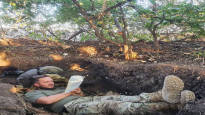A Ukrainian special forces soldier always has a book with him. If it doesn’t fit anywhere else, he shoves the book inside his bulletproof vest.
The man’s fighting name is Frenchman, so we’ll call him by that name in this story. The real names and exact locations of the soldiers on the front are not being disclosed for security reasons.
Frenchman has read 44 books during the year.
– I read in trenches, bunkers, anywhere. It’s a way to forget what’s going on around you for a while, says Frenchman in a video interview from the front.
In the video below, Frenchman shows what books his teammates are reading in the base. The video was filmed in October 2023, and the special forces have since moved to a new station location.
During the video interview, shelling can be heard in the background. Frenchman and his team have reached new positions in the village of Robotnye in southern Ukraine at the beginning of October. They are waiting for the background troops to arrive.
– Now is a good time to read, he says and digs a book out of the front pocket of his bulletproof vest. Right now Frenchman is reading a Polish fantasy writer Radek Rakin novel, Tale of the Snake’s Heart, directly translated into Finnish as ”Tale of the Snake’s Heart”.
– 99 percent of war is waiting and one percent action, so books are worn out.
Although Frenchman’s life is now war, he also devours war books. They help to understand one’s own feelings, fear and sadness.
– The war is the same as it was a hundred or 2,000 years ago, Frenchman reflects.
– It is not only necessary to understand the operation of the weapon, but also the thinking of people in these conditions.
Frenchman’s teammates are also reading. At the base, almost everyone has a book next to the beds. Frenchman digs out a bag from under his bed. There, the next opuses are waiting for the right moment.
– My favorite moment is starting a new book. It’s when you enter a new world, a new perspective, says Frenchman.
Young people line up in bookstores
The Ukrainian book market collapsed after the Russian invasion. But soon the book industry took off. In Ukraine, we can even talk about a boom in new bookstores. 178 new publishing houses and bookstores were established in the country last year.
– There are longer queues at bookstores than there used to be at McDonald’s, says the director of the Vivat book publishing house Julia Orlova.
Orlova recalls that so many people came to the bookstore’s opening in Kyiv that there was almost no space between the shelves.
The letter spreads especially on social media. So many new bookstores have been established that a meme has already been made about the opening of a bookstore in the center of Kyiv.
– Books also have an important symbolic meaning. We are rebuilding Ukrainian-speaking Ukraine, says Orlova.
In the summer, the president of Ukraine Volodymyr Zelenskyi signed a law banning the importation of new Russian-language books. The law does not prohibit the publication of books in Russian, but the majority of Ukrainian authors have started to write only in Ukrainian.
– After the great invasion of Russia, we removed books in Russian from bookstores and libraries. We mainly put them in the paper collection, says Orlova.
Orlova says that the demand for Ukrainian-language literature is huge, and there is a severe shortage of translators and publishers.
According to Orlova, several Ukrainian-language books are currently sold out, and new editions are difficult to obtain during the war. There have also been a huge number of new Ukrainian writers during the war.
The Book Chamber of Ukraine reported in July that a total of 5.6 million books were printed between January and June of this year. Only 6.1 million books were printed in the whole of last year.
– The demand is also strong for children’s and adults’ books about the war, says Orlova.
Russian-language literature dominated before the war
For 20 years before the war, works in Russian dominated the Ukrainian book industry. Their share of the book market was 80–85 percent. Much of Ukrainian literature—like Nikolai Gogol works – were originally written in Russian. Gogol is known, for example, for Dead Souls.
– Even in 2020, the share of Russian books in the turnover of large bookstores was up to 70 percent, says Orlova.
After 2014, after Russia’s annexation of Crimea, several writers began to abandon the Russian language. After the big attack, the trend rose to new proportions.
In a survey on reading conducted in Ukraine this year, 54 percent of respondents said they only read in Ukrainian. There is an increase of 22 percentage points compared to 2020. The number of people who read only in Russian in Ukraine has dropped to less than ten percent this year.
– Now there is a renaissance of the Ukrainian book, Orlova says.
According to the law that entered into force in 2019, the state language of Ukraine is Ukrainian, and the law obliges employees to use Ukrainian in schools and restaurants, for example. This year, the Ukrainians have already done something about the use of the Russian language and violation of the language law more than 3000 complaints to the Chancellor of Justice.
“You can kill without killing”
Frenchman also only reads in Ukrainian and English.
– Sometimes I read the history of the Ukrainian language. In small parts. It’s a good way to fall asleep if there’s too much adrenaline, says Frenchman.
The interview has to be stopped a little in the middle, because Frenchman’s teammates order him to the next positions. Finally, Frenchman reflects on the meaning of books and summarizes:
– You can suffer without suffering. You can love without love. You can kill without killing, however.
